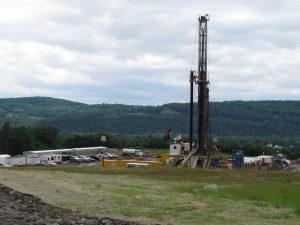
Harrisburg, Pa. — The Pennsylvania House of Representatives is expected to vote this week on so-called “Energize PA” legislation that is designed to accelerate approvals of oil and gas projects in the state. Part of this package is House Bill 1106, sponsored by Republican state Rep. Michael J. Puskaric of Allegheny and Washington Counties in Western Pennsylvania, and House Bill 1107, sponsored by Republican state Rep. Timothy J. O’Neil of Washington County.
Here are some facts about these bills and the harm they would cause to environmental protections in the Commonwealth:
1) Local communities and individuals in Pennsylvania have the right under federal and state law to participate in permitting decisions that affect their air and water quality. The kind of accelerated or automatic permitting these bills anticipate, as described below, will make it impossible for those affected to claim those rights.
2) The bills remove the authority to issue air, water, and hazardous waste permits from the Pennsylvania Department of Environmental Protection (DEP).
3) The bills transfer DEP’s environmental permitting authority to a newly created “Permitting Commission” run by five political appointees.
4) The bills guarantee that new permits will be issued within 30 days of application – they will either be approved or “deemed approved” if the commission fails to make a decision within the required time frame.
5) Many permit requirements in Pennsylvania are established under the federal Clean Air Act and Clean Water Act, and cannot be preempted by state laws that require automatic approval of permitting within 30 days. For example, before construction can begin on any proposed facility that will be a major source of air pollution, the company must obtain a federal Clean Air Act permit that requires the best available pollution controls and a public hearing. These requirements cannot be preempted by a state law that is focused only on making sure that industry get permits approved even faster than they already are. EPA is required under federal law to reject any attempt by states to undermine environmental standards or public participation rights guaranteed under the federal Clean Air and Clean Water acts.
6) If there is a “backlog” of permit applications awaiting approval that is a problem the state legislature created by slashing the budget and staff of DEP. Transferring authority to a brand-new political commission does not fix the problem. Lawmakers cut DEP’s budget by 24 percent and staffing by 23 percent from fiscal 2007 to fiscal 2019, depriving the agency of the resources it needs to review environmental permit applications.
7) DEP’s Oil and Gas Program suffered some of the deepest cuts, with its staffing reduced from 226 to 190 employees from 2006 to 2018. In 2018, the program also ran a deficit of $600,000 per month.
8) While Pennsylvania’s environmental budgets were being slashed, shale gas production in the state jumped from half a billion cubic feet per day in 2008 to more than 18.7 billion cubic feet per day as of June 2019, a thirty-seven fold increase.6 The industry has expanded at breakneck speed – faster than in any other state – and it is hard to see how it could grow any faster, with or without “expedited” permits.
9) Despite the budget cutbacks, DEP in 2018 managed to issue 2,149 oil and gas permits even though industry drilled only 917 wells that year.7 Given the demands of the market, faster permit approvals are not needed.
In summary, the Pennsylvania legislature should reject this harmful legislation, and Governor Tom Wolf should make clear that he intends to veto these bills if passed. State lawmakers should instead restore sufficient funding to DEP and give their own environmental agency the tools needed to ensure that approved permits meet all the requirements of federal and state law.


